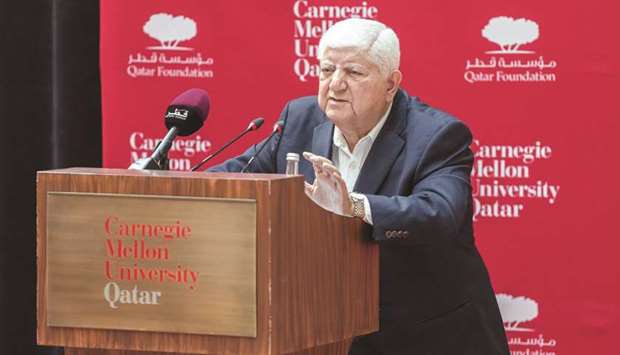Changing LNG market dynamics require Qatar to adjust plan: Dr Ibrahim

Major changes on the supply and demand sides of the global liquefied natural gas (LNG) market require Qatar to adjust its strategy to maintain its position as the world’s leading LNG supplier, according to HE Dr Ibrahim B Ibrahim, Economic Adviser at the Amiri Diwan.
Dr Ibrahim was speaking at Carnegie Mellon University in Qatar (CMU-Q) as a part of the ‘Dean’s Lecture Series’, a forum for leaders in business and government to discuss issues that affect the future of Qatar and the wider world.
“As we develop Qatar’s long-term policies for LNG, it is crucial that young people understand the issues that we face. LNG policy has an enormous impact on Qatar and I am delighted to share the challenges and opportunities with young professionals who will one day make these policies themselves,” said Dr Ibrahim.
“The Dean’s Lecture Series is an opportunity to speak directly to the students about issues that are crucial to Qatar,” he said yesterday.
Dr Ibrahim noted that the LNG sector faced challenges on the supply side, including the development of the shale gas industry sector in the US, the expansion of LNG supply from Australia, and the expected ascendance of the LNG positions of Russia and African countries.
On the demand side, there is expected expansion of gas consumption in large economies such as China, India and Brazil.
Dr Ibrahim suggested that Qatar should adhere to the pillars of its LNG strategy to weather these challenges. These encompass a fully integrated production and delivery model, cost optimisation in the LNG delivery model, and the leveraging of the Qatargas brand, which is associated with “reliability, flexibility, loyalty, and a strict compliance” to contractual obligations.
While the development of shale gas would have a negative impact on LNG prices in the short-term, Dr Ibrahim argued that the impact could be positive in the long-term, particularly for large gas suppliers such as Qatar.
In other words, the development of shale gas would contribute to lengthening the duration of gas as a viable source of energy.
Qatar should also intensify the development of its gas resources, Dr Ibrahim said, noting that the country has recently lifted the moratorium on expanding production from the North Field, and announced its intention to increase its LNG production capacity by 32mn tonnes. This announcement is expected to affect future projects from marginal suppliers, and the resulting capacity would allow Qatar to maintain its position as a leading world LNG exporter for years to come.
Michael Trick, dean, CMU-Q, noted the educational value of Dr Ibrahim’s remarks: “Our students study science, business and technology, fields that all intersect with the oil and gas sector. His Excellency’s perspective will illustrate to them how the concepts they are studying are managed from a policy standpoint. We very much appreciate HE Dr Ibrahim’s dedication to education and cultivating human capital.”
Carnegie Mellon Qatar offers undergraduate programs in biological sciences, business administration, computational biology, computer science, and information systems.
Graduates from CMU-Q are making a deep impact in Qatar and around the world, including within Qatar’s LNG sector.